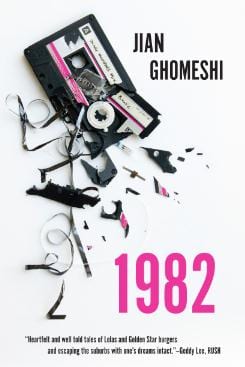
Jian Ghomeshi hosts Q, a popular CBC Radio One national arts program. Credit: Courtesy of CBC
Jian Ghomeshi, CBC radio personality, musical talent manager and former member of Canadian folk-rock group Moxy Früvous, is not gay. However, reading 1982, Ghomeshi’s part memoir, part cultural study, one gets the impression he would go gay for David Bowie.
1982 was an important year for the 14-going-on-15 Ghomeshi, musically as well as socially. The New Wave movement was in full swing: bands like the Talking Heads, A Flock of Seagulls and Toronto’s own Spoons spreading their synth-love across the land, with Bowie presiding above all like an androgynous god. In 1982 Ghomeshi – the son of Persian-Iranian immigrants living in Thornhill, Ontario – was just beginning to discover his own musical talents and trying to find his place among peers. He had also fallen in love for the first time with his very own “Bowie girl.”
At 14, young Ghomeshi was an outsider; an English-born Persian-Canadian in a mostly white Thornhill suburb, with a serious lack of non-white musical role models; a kind, sensitive, artsy kid in a macho society; a New Wave devotee worshipping the music coming out of England while trying to reconcile this scene with his love of rock. This provides the backdrop for Ghomeshi’s first love.
Wendy was a beautiful, high school-aged New Wave goddess: a girl version of Bowie. In 1982 Wendy was as important to Ghomeshi as New Wave music, and the sweet, heart-breaking relationship provides a thread through the book that also explores racism, hockey, family dynamic and identity.
Ghomeshi is in the difficult position of trying to explain the ’80s to those who weren’t alive while musing on the era for those who survived them, and he achieves a successful balance between cultural scenester and crotchety “old” man (he’s only 45). While painting a fascinating picture of the local and global musical scene he worshipped, and encapsulating the world around him, he often, hilariously, veers into the “walked 15 miles uphill in the snow” spirit, examining technology and society. While the ’80s are often a punch line in pop-culture jokes, Ghomeshi compassionately and humorously grounds the era in the trials and tribulations of his adolescence.
1982 is strongest when Ghomeshi is telling personal stories, like his holy communion with Canadian rock band Rush, his ill-fated attempt to wear eyeliner to school, and the loss of his prized Adidas bag-turned-projectile at the hands of a guerilla punk rocker with the desire to assault Joan Jett. The personal narrative is laced not only with worship of Ghomeshi’s musical heroes, but the times when he came in contact with them.
Even for someone not terribly familiar with the music scene of the early ’80s, or the New Wave or New Romantic musical movements, the book is an engaging, often laugh-out-loud funny read. We all have musical or cultural obsessions; we were all once awkward teenagers trying to find our place among the scenes we adored. While the writing is often simplistic and some of the jokes groan-worthy, the book is as much a time capsule as it is a celebration of 1982. His memoir is as timelessly Canadian as it is the archetypal story of an adolescent’s coming-of-age.
I hope to get the chance to interview him, because despite all of this, I’m dying to ask the question: would Ghomeshi go gay for Bowie?
1982
Jian Ghomeshi
Penguin
$30


 Why you can trust Xtra
Why you can trust Xtra


